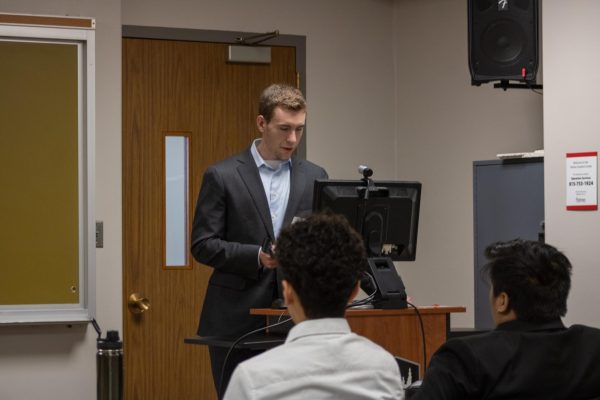Spanish homework goes online
November 10, 2004
This semester is a first for the Spanish department with a program called “Quia,” which allows students enrolled in Spanish courses to complete their homework assignments online.
“Students purchase a code that gives them access to the electronic workbook Quia, which they access online in the Language Learning and Training Center in Watson Hall,” said Michael Morris, an associate professor of Spanish and coordinator of elementary and intermediate Spanish.
Although written workbooks are no longer used in Spanish courses, some students still have to submit forms of written work.
“Assignments will vary from instructor to instructor,” Spanish instructor Karen Gutierrez said.
Students like Lisa Jackson, a freshman undecided liberal arts and sciences major, have to submit assignments online and turn in others at class.
“Basically, it’s making it 10 times harder for me to do the work,” said Jackson, who is enrolled in FLSP 201. “Why do I have to do this program online if I’m also turning in written work? Either have all of it done online, or have all of it turned in.”
Overall, the whole program is annoying, Jackson said.
“I sit there getting frustrated in general, and since I have to do it two ways, I have to copy the work into a Word document so I don’t have to type it again,” she said.
While there may be drawbacks to the system, there are advantages.
Both the University Bookstore and the Village Commons Bookstore sell Spanish workbooks for $41.35 (FLSP 101 and 201) and $76.05 (FLSP 102). A one-year subscription on www.quia.com costs $49.
The Quia program also grades most of the exercises and activities automatically. This means instructors do not have to spend hours grading homework and can spend more time on class preparation, Morris said.
One aspect students may like about the new system is the immediate feedback on their work, Morris said.
“The activities in the Quia electronic workbook are more engaging,” he said. “In addition, the grades students receive in the workbook go into an electronic file.”
Students can access their file at any time to see what grade they are earning.
The textbooks used for Spanish classes also changed this semester. The previous textbook was used for about five years, Morris said.
“The methodology of the former textbook was outdated and the instructors said it was difficult to cover all the material in the textbook in three semesters,” he said. “In addition, the technology for the old textbook was not up-to-date and in some cases, non-existent.”
Changing textbooks is a common practice at most colleges and universities, Gutierrez said.
“I enjoy the text. As far as feedback from my students, I haven’t had any extremely negative comments on it,” she said.












